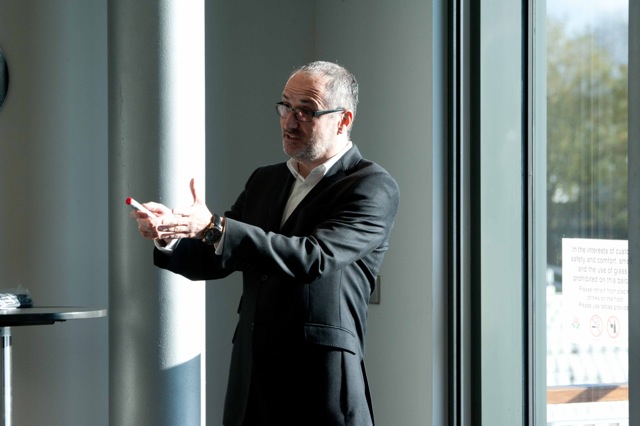You will have heard it several times from many people who need to perform in front of an audience; actors, presenters, athletes, singers and politicians to name but a few. If asked whether or not they feel nervous an honest reply is forthcoming. They admit that they are indeed nervous and claim it to be a good thing, something that helps inspire them to succeed. I fundamentally disagree. However good they may have been at that moment they were delivering, they would be even better if they were not nervous. I believe that if they control their nerves and eventually conquer them entirely, their performances will be consistently good.
Why Nervous Energy Undermines Your Performance
Our natural human state creates a Fight, Flight or Flee response. Our subconscious mind is working overtime to tell us something is happening that needs our attention. This notification arrives in the form of adrenaline, a chemical reaction. Our conscious mind now knows something is up, this is the moment to seize control of the situation and tell yourself that the adrenaline in question is caused by excitement and not nerves. You are not nervous you are excited, keep repeating that as a mantra and eventually it will be the case; you will no longer be nervous, you will be excited.
Nerves, What are They Good For? Absolutely Nothing.
Being nervous is a massive negative. It causes; anxiety, loss of clarity, forgetfulness, it makes you self-edit leading to you undercutting your performance and undermining your original well thought out plan. Being nervous heightens your self-consciousness while dampening down your ability to think on your feet, pivot and improvise if needed. You may be very well prepared, well-rehearsed and well researched however, all of the aforementioned will count for nothing if you are overcome (in various degrees) with nerves.
Why Excitement Is Better Than Nerves When Public Speaking
The state of excitement is a better place to be than being in state of nervousness. Being nervous creates a feeling of dread, of not looking forward to something, worrying and not getting a feeling of enjoyment in advance of you being on the stage, whereas excitement provides the exact opposite feeling. With excitement you feel energised, focused, relaxed, confident, you will be looking forward to speaking, having a sense of that you cannot wait to be stood in front of an audience. The mantra above helps focuses your mind and helps you to gain control of your adrenaline. Remember; you’re not nervous, you are excited!
Building Confidence Before You Start
To begin with you will be playing a trick on yourself, convincing yourself that you are not nervous and that you are excited. The trick is to ensure that you have your adrenaline under control, thinking positively and enjoying the thought of you going to speak in front of a group of people. Taking a public speaking course can help you build this confidence and learn practical techniques. When it comes to the moment you are introduced, you will exude confidence and have the aura of someone who is comfortable and wants to be stood where you are stood. In turn this gives the audience confidence, makes them feel comfortable and relaxed and creates a sense of calm. This way they are fully attentive and engaged while you are fully engaging.
Train Your Brain to Stay Calm Before You Speak
Once you have created the habit of thinking that you are excited rather than nervous you will naturally take control of your adrenaline and make it work for you. What happens over time is that you will not get a dose of adrenaline at all. The way you will feel before you get up to speak or in the build up to the moment you start to present, is much the same as you would for any other, often mundane, activities which you wouldn’t give any extra thought. If an accountant is doing a tax return, they are very unlikely to get nervous or indeed excited.
How Controlling Adrenaline Improves Public Speaking
There is a sacrifice worth making. What happens when you are very nervous before speaking and you have a better-than-expected response you will get an explosion of adrenaline. You will be “buzzing”, you may find that you lose your appetite and later, when you go to bed, you can’t sleep. Although when one experiences a surge of adrenaline it creates a high and feels good. If, however, you are excited and not nervous before you speak and you have taken control of your adrenaline, you tend not to feel a great deal, which is a far better state of mind for pre, post and during the presentation.
Be In Control
Once you have mastered taking control of your nerves, you will experience, in time, no feeling of nervousness and actually no feeling of excitement. You will have trained your brain to know that getting up and speaking is just another part of what it is you do and you will do completely naturally.
If you’re ready to take the next step and conquer your public speaking fears, contact us today to learn how our expert coaching can help you speak with confidence and ease.




